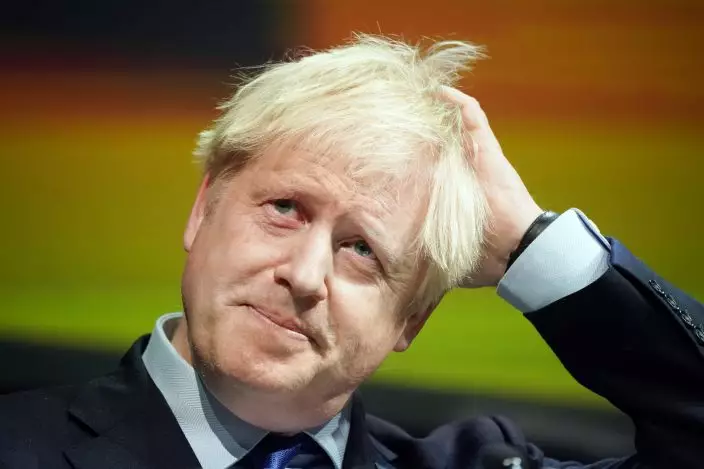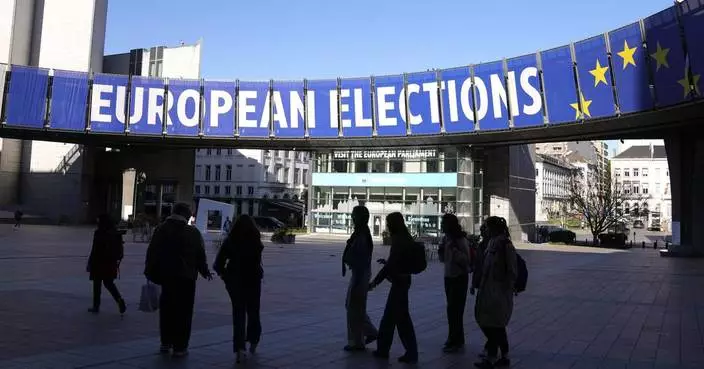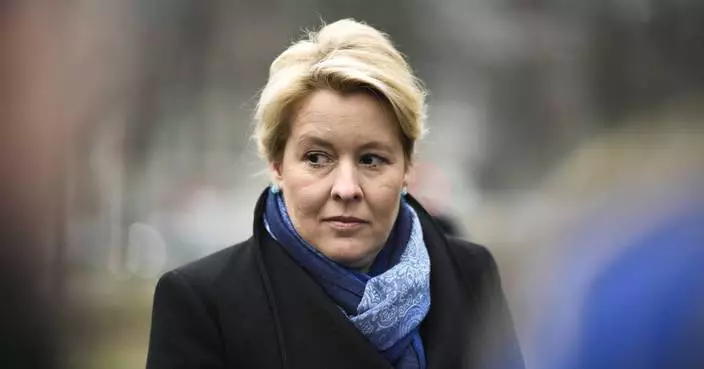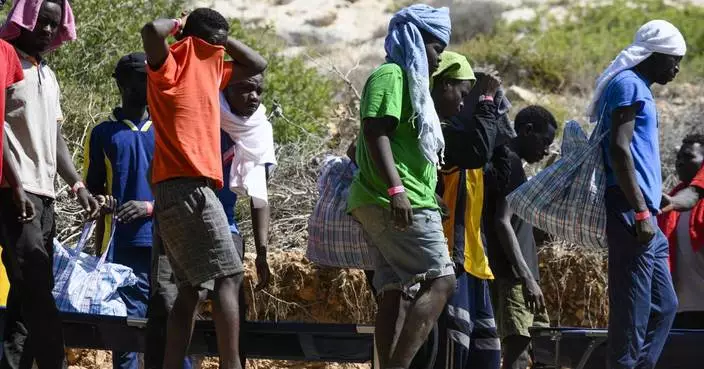British Prime Minister Boris Johnson will have his first meeting with European Commission President Jean-Claude Juncker on Monday in search of a longshot Brexit deal.
The two men are scheduled to hold talks over a lunch of snails and salmon in Luxembourg, amid claims from the U.K. — though not the EU — that a deal is in sight.
Johnson says the U.K. will leave the EU on the scheduled Oct. 31 date, with or without a withdrawal agreement. But he insists he can strike a revised divorce deal with the bloc in time for an orderly departure. The agreement made by his predecessor, Theresa May, was rejected three times by Britain's Parliament.

Britain's Prime Minister Boris Johnson makes a speech at the Convention of the North at the Magna Centre in Rotherham, England, Friday, Sept. 13, 2019. Johnson will meet with European Commission president Jean-Claude Juncker for Brexit talks Monday in Luxembourg. The Brexit negotiations have produced few signs of progress as the Oct. 31 deadline for Britain’s departure from the European Union bloc nears. (Christopher FurlongPool photo via AP)
Johnson said in a Daily Telegraph column Monday that he believes "passionately" that a deal can be agreed and approved at a summit of EU leaders on Oct. 17-18.
But the EU says it is still waiting for firm proposals from the U.K.
The key sticking point is the "backstop," an insurance policy in May's agreement intended to guarantee an open border between EU member Ireland and the U.K.'s Northern Ireland. That is vital both to the local economy and to Northern Ireland's peace process.
British Brexit supporters oppose the backstop because it keeps the U.K. bound to EU trade rules, limiting its ability to forge new free trade agreements around the world after Brexit.
Britain has suggested the backstop could be replaced by "alternative arrangements," but the EU says it has yet to hear any workable suggestions.
Neither side expects a breakthrough Monday, but much still rests on Johnson's encounter with Juncker, who like other EU officials is tired of the long-running Brexit drama, and wary of Johnson's populist rhetoric.
The British leader has vowed to leave the bloc "do or die" and compared himself to angry green superhero the Incredible Hulk, telling the Mail on Sunday newspaper: "The madder Hulk gets, the stronger Hulk gets, and he always escapes ... and that is the case for this country."
European Parliament Brexit chief Guy Verhofstadt branded the comparison "infantile," and it also earned a rebuke from "Hulk" star Mark Ruffalo.
Ruffalo tweeted: "Boris Johnson forgets that the Hulk only fights for the good of the whole. Mad and strong can also be dense and destructive."
Monday's meeting marks the start a tumultuous week, with the Brexit deadline just 45 days away.
On Tuesday, Britain's Supreme Court will consider whether Johnson's decision to prorogue — or suspend — the British Parliament for five weeks was lawful, after conflicting judgments in lower courts.
Johnson sent lawmakers home until Oct. 31, a drastic move that gives him a respite from rebellious lawmakers determined to thwart his Brexit plan.
Last week, Scotland's highest civil court ruled the prorogation illegal because it had the intention of stymieing Parliament. The High Court in London, however, said it was not a matter for the courts.
If the Supreme Court overturns the suspension, lawmakers could be called back to Parliament as early as next week.
Many lawmakers fear a no-deal Brexit would be economically devastating, and are determined to stop the U.K. from crashing out of the bloc on Oct. 31.
Just before the suspension, Parliament passed a law that orders the government to seek a three-month delay to Brexit if no agreement has been reached by late October.
Johnson insists he will not seek a delay under any circumstances, though it's not clear how he can avoid it.
Foreign Secretary Dominic Raab said Monday that the government would obey the law, but suggested it would try to find loopholes.
"I think the precise implications of the legislation need to be looked at very carefully," he told the BBC. "We are doing that."
Follow AP's full coverage of Brexit and British politics at: https://www.apnews.com/Brexit
BRUSSELS (AP) — European Union nations endorsed sweeping reforms to the bloc’s failed asylum system on Tuesday as campaigning for Europe-wide elections next month gathers pace, with migration expected to be an important issue.
EU government ministers approved 10 legislative parts of The New Pact on Migration and Asylum. It lays out rules for the 27 member countries to handle people trying to enter without authorization, from how to screen them to establish whether they qualify for protection to deporting them if they’re not allowed to stay.
Hungary and Poland, which have long opposed any obligation for countries to host migrants or pay for their upkeep, voted against the package but were unable to block it.
Mainstream political parties believe the pact resolves the issues that have divided member nations since well over 1 million migrants swept into Europe in 2015, most fleeing war in Syria and Iraq. They hope the system will starve the far right of vote-winning oxygen in the June 6-9 elections.
However, the vast reform package will only enter force in 2026, bringing no immediate fix to an issue that has fueled one of the EU’s biggest political crises, dividing nations over who should take responsibility for migrants when they arrive and whether other countries should be obligated to help.
Critics say the pact will let nations detain migrants at borders and fingerprint children. They say it’s aimed at keeping people out and infringes on their right to claim asylum. Many fear it will result in more unscrupulous deals with poorer countries that people leave or cross to get to Europe.
Europe’s asylum laws have not been updated for about two decades. The system frayed and then fell apart in 2015. It was based on the premise that migrants should be processed, given asylum or deported in the country they first enter. Greece, Italy and Malta were left to shoulder most of the financial burden and deal with public discontent. Since then, the ID-check-free zone known as the Schengen Area has expanded to 27 countries, 23 of them EU members. It means that more than 400 million Europeans and visitors, including refugees, are able to move without showing travel documents.
Some 3.5 million migrants arrived legally in Europe in 2023. Around 1 million others were on EU territory without permission. Of the latter, most were people who entered normally via airports and ports with visas but didn’t go home when they expired. The pact applies to the remaining minority, estimated at around 300,000 migrants last year. They are people caught crossing an external EU border without permission, such as those reaching the shores of Greece, Italy or Spain via the Mediterranean Sea or Atlantic Ocean on boats provided by smugglers.
The country on whose territory people land will screen them at or near the border. This involves identity and other checks -– including on children as young as 6. The information will be stored on a massive new database, Eurodac. This screening should determine whether a person might pose a health or security risk and their chances of being permitted to stay. Generally, people fleeing conflict, persecution or violence qualify for asylum. Those looking for jobs are likely to be refused entry. Screening is mandatory and should take no longer than seven days. It should lead to one of two things: an application for international protection, like asylum, or deportation to their home country.
People seeking asylum must apply in the EU nation they first enter and stay until the authorities there work out what country should handle their application. It could be that they have family, cultural or other links somewhere else, making it more logical for them to be moved. The border procedure should be done in 12 weeks, including time for one legal appeal if their application is rejected. It could be extended by eight weeks in times of mass movements of people. Procedures could be faster for applicants from countries whose citizens are not often granted asylum. Critics say this undermines asylum law because applicants should be assessed individually, not based on nationality. People would stay in “reception centers” while it happens, with access to health care and education. Those rejected would receive a deportation order.
To speed things up, a deportation order is supposed to be issued automatically when an asylum request is refused. A new 12-week period is foreseen to complete this process. The authorities may detain people throughout. The EU’s border and coast guard agency would help organize joint deportation flights. Currently, less than one in three people issued with an order to leave are deported. This is often due to a lack of cooperation from the countries these people come from.
The new rules oblige countries to help an EU partner under migratory pressure. Support is mandatory, but flexible. Nations can relocate asylum applicants to their territory or choose some other form of assistance. This could be financial -– a relocation is evaluated at 20,000 euros ($21,462) per person -– technical or logistical. Members can also assume responsibility for deporting people from the partner country in trouble.
Two issues stand out: Will member countries ever fully enact the plan, and will the EU’s executive branch, the European Commission, enforce the new rules when it has chosen not to apply the ones already in place? The commission is due to present a Common Implementation Plan by June. It charts a path and timeline to get the pact working over the next two years, with targets that the EU and member countries should reach. Things could get off to a rocky start. Hungary, which has vehemently opposed the reforms, takes over the EU’s agenda-setting presidency for six months on July 1.
Associated Press journalists Renata Brito in Barcelona, Spain, contributed to this report.

Migrants sit on the deck of the Sea Watch-3 rescue ship in the Maltese search and rescue zone of the Mediterranean Sea on Oct. 19, 2021. IEuropean Union nations will discuss on Tuesday, May 14, 2024, sweeping new reforms to the bloc's failed asylum system as campaigning for Europe-wide elections next month gathers pace, with migration expected to be an important issue. (AP Photo/Valeria Mongelli, File)

FILE - Migrants disembark from a Greek coast vessel after a rescue operation, at the port of Mytilene, on the northeastern Aegean Sea island of Lesbos, Greece, Monday, Aug. 28, 2023. European Union nations will discuss on Tuesday, May 14, 2024, sweeping new reforms to the bloc's failed asylum system as campaigning for Europe-wide elections next month gathers pace, with migration expected to be an important issue. (AP Photo/Panagiotis Balaskas, File)

FILE - Two men share a meal in a makeshift tent camp outside the Petit Chateau reception center in Brussels, Tuesday, Jan. 17, 2023. European Union nations will discuss on Tuesday, May 14, 2024, sweeping new reforms to the bloc's failed asylum system as campaigning for Europe-wide elections next month gathers pace, with migration expected to be an important issue. (AP Photo/Olivier Matthys, File)

FILE -Migrants rest on the deck of Sea Watch-3 rescue ship in Maltese SAR zone, Tuesday, Oct. 19, 2021. European Union nations will discuss on Tuesday, May 14, 2024, sweeping new reforms to the bloc's failed asylum system as campaigning for Europe-wide elections next month gathers pace, with migration expected to be an important issue. (AP Photo/Valeria Mongelli, File)

FILE - A cemetery, filled with graves mostly from migrants trying to reach the Greek island of Lesbos, is seen from above at Kato Tritos village on the northeastern Aegean Sea island of Lesbos, Greece, on Wednesday, April 17, 2024. European Union nations will discuss on Tuesday, May 14, 2024, sweeping new reforms to the bloc's failed asylum system as campaigning for Europe-wide elections next month gathers pace, with migration expected to be an important issue. (AP Photo/Panagiotis Balaskas, File)

FILE - Opponents of France's immigration law protest with banners that read, "Freedom, equality, fraternity" and "no to the immigration law" at Trocadero Plaza near Eiffel Tower in Paris, Sunday, Jan. 21, 2024. European Union nations will discuss on Tuesday, May 14, 2024, sweeping new reforms to the bloc's failed asylum system as campaigning for Europe-wide elections next month gathers pace, with migration expected to be an important issue. (AP Photo/Thomas Padilla, File)

FILE - Refugees wait in line at the Office of Migration in Brussels on Thursday, Oct. 1, 2015. European Union nations will discuss on Tuesday, May 14, 2024, sweeping new reforms to the bloc's failed asylum system as campaigning for Europe-wide elections next month gathers pace, with migration expected to be an important issue. (AP Photo/Geert Vanden Wijngaert, File)

FILE - Migrants aboard a rubber boat end up in the water while others cling on to a centifloat before being rescued by a team of the Sea Watch-3, around 35 miles away from Libya, Monday, Oct. 18, 2021. European Union nations will discuss on Tuesday, May 14, 2024, sweeping new reforms to the bloc's failed asylum system as campaigning for Europe-wide elections next month gathers pace, with migration expected to be an important issue. (AP Photo/Valeria Mongelli, File)


















